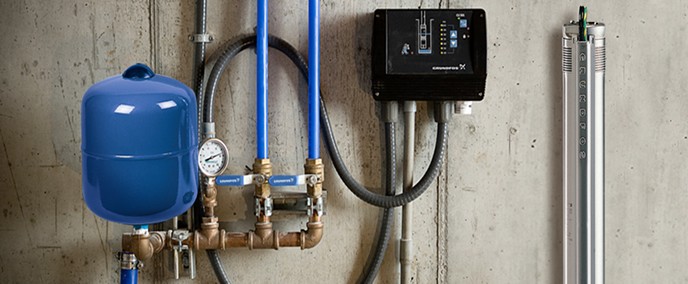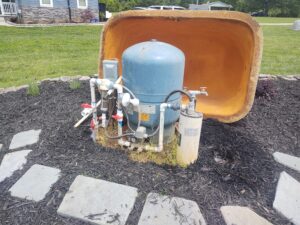Professional Pump Repairs & Installation Solutions: Enhancing Your Water System's Performance
Understanding the Key Elements of Effective Water Filtering Equipments

Significance of Water Filtering Systems
Water filtration systems play a vital role in making sure accessibility to secure and tidy alcohol consumption water by efficiently eliminating pollutants and contaminants. These systems are vital in dealing with the expanding problems over water high quality and the prospective health dangers connected with consuming polluted water. By utilizing numerous purification systems such as reverse osmosis, activated carbon, and UV sterilization, water purification systems can effectively get rid of damaging materials like germs, infections, heavy steels, and chemicals from the water system.
Moreover, water filtering systems help to boost the preference and odor of water by removing chlorine, sediments, and other pollutants that can affect its quality. Water Filtration Systems. This enhancement in water top quality not just makes it extra palatable but additionally motivates individuals to drink an appropriate quantity of water daily, advertising much better hydration and overall health and wellness
Kinds of Purification Components

Physical filters are made to literally strain out pollutants from the water. These filters can be constructed from products like ceramic, carbon, or even sand, and they function by trapping particles bigger than the filter's pores as water passes with.
Chemical filters use different chemical procedures to get rid of pollutants from the water. Instances consist of triggered carbon filters, which adsorb pollutants, and turn around osmosis membrane layers, which utilize pressure to separate pollutants from the water.
Organic filters make use of living microorganisms like algae or microorganisms to damage down organic matter and contaminants in the water. These filters are frequently utilized in wastewater treatment plants or natural water purification systems.
Comprehending the various kinds of purification components is vital for selecting the most appropriate water purification system for particular purification demands.
Feature of Sediment Filters
Debris filters play a vital duty in water purification systems by properly recording strong fragments put on hold in the water. These filters are commonly the initial line of defense in a filtration system, getting rid of bigger particles such as sand, silt, dirt, and corrosion prior to the water moves via finer purification stages. By trapping these sediments, the filters avoid them from getting to downstream elements, thus extending the life-span and efficiency of basics the whole system.
The feature of sediment filters is vital in preserving water top quality and securing delicate tools from damages brought on by particles. In addition, by eliminating visible fragments, sediment filters boost the quality and taste of the water. Consistently cleansing or replacing debris filters is vital to guarantee optimum efficiency. Neglecting this maintenance can cause blocking, decreased water flow, and compromised purification effectiveness. On the whole, debris filters are crucial elements that contribute significantly to the performance of water purification systems.
Role of Triggered Carbon Filters
Playing a crucial function in water filtration systems, turned on carbon filters contribute in eliminating contaminations and impurities from the water supply. These filters are made to adsorb and catch a vast array of pollutants, including chlorine, unpredictable organic substances (VOCs), pesticides, and herbicides. The triggered carbon material has a large surface, permitting the effective trapping of pollutants through a procedure called adsorption. As water passes with the filter, the turned on carbon holds and attracts onto the contaminations, ensuring that the water that comes out on the other side is cleaner and much safer for usage.
Activated carbon filters are highly reliable at boosting the taste and smell of water by lowering chemicals that can find out here impact its top quality. Due to their flexibility and reliability, activated carbon filters are a vital part in making sure that water is detoxified to the highest standards prior to reaching customers.
Recognizing Reverse Osmosis Systems
Reverse osmosis systems are sophisticated water filtering systems that utilize a sophisticated process to get rid of impurities and contaminations from drinking water. These systems work by using pressure to the water, compeling it through a semi-permeable membrane. This membrane layer functions as an obstacle, enabling only distilled water molecules to pass through, while blocking larger particles such as minerals, chemicals, and other impurities. Therefore, the water that comes out on the other side is considerably cleaner and much safer for usage.
One secret benefit of reverse osmosis systems is their capability to eliminate a wide variety of contaminants, including heavy steels, liquified solids, germs, and viruses. This makes them very efficient in boosting the overall high quality and safety and security of alcohol consumption water. Furthermore, reverse osmosis systems are relatively low-maintenance and can be set up under the sink or in a see here now central filtration system, giving hassle-free access to clean water throughout the family. Generally, recognizing just how reverse osmosis systems function can aid people make educated decisions regarding their water filtering needs.
Verdict
In final thought, effective water filtering systems are critical for making sure clean and secure drinking water. By recognizing the feature and role of each component, individuals can make informed choices when selecting a water filtration system.
Water filtration systems play a crucial function in making certain accessibility to safe and tidy drinking water by effectively eliminating impurities and contaminants. By using different filtration systems such as reverse osmosis, turned on carbon, and UV sanitation, water filtration systems can successfully eliminate hazardous compounds like germs, viruses, hefty metals, and chemicals from the water supply.
Debris filters play a crucial function in water filtration systems by properly capturing strong bits put on hold in the water (Water Filtration Systems).Playing a critical duty in water purification systems, activated carbon filters are instrumental in getting rid of impurities and pollutants from the water supply.Reverse osmosis systems are advanced water filtering systems that utilize a sophisticated process to eliminate pollutants and pollutants from drinking water